Loose motions in dogs is one of the most common health problems pet parents face. It can look harmless at first, but frequent or prolonged diarrhoea in dogs can signal deeper issues in their digestive system.
Understanding the causes, knowing what to feed, and recognizing when to call your veterinarian can make all the difference to your pet’s recovery.
What Commonly Causes Diarrhoea or Loose Motions in Dogs?
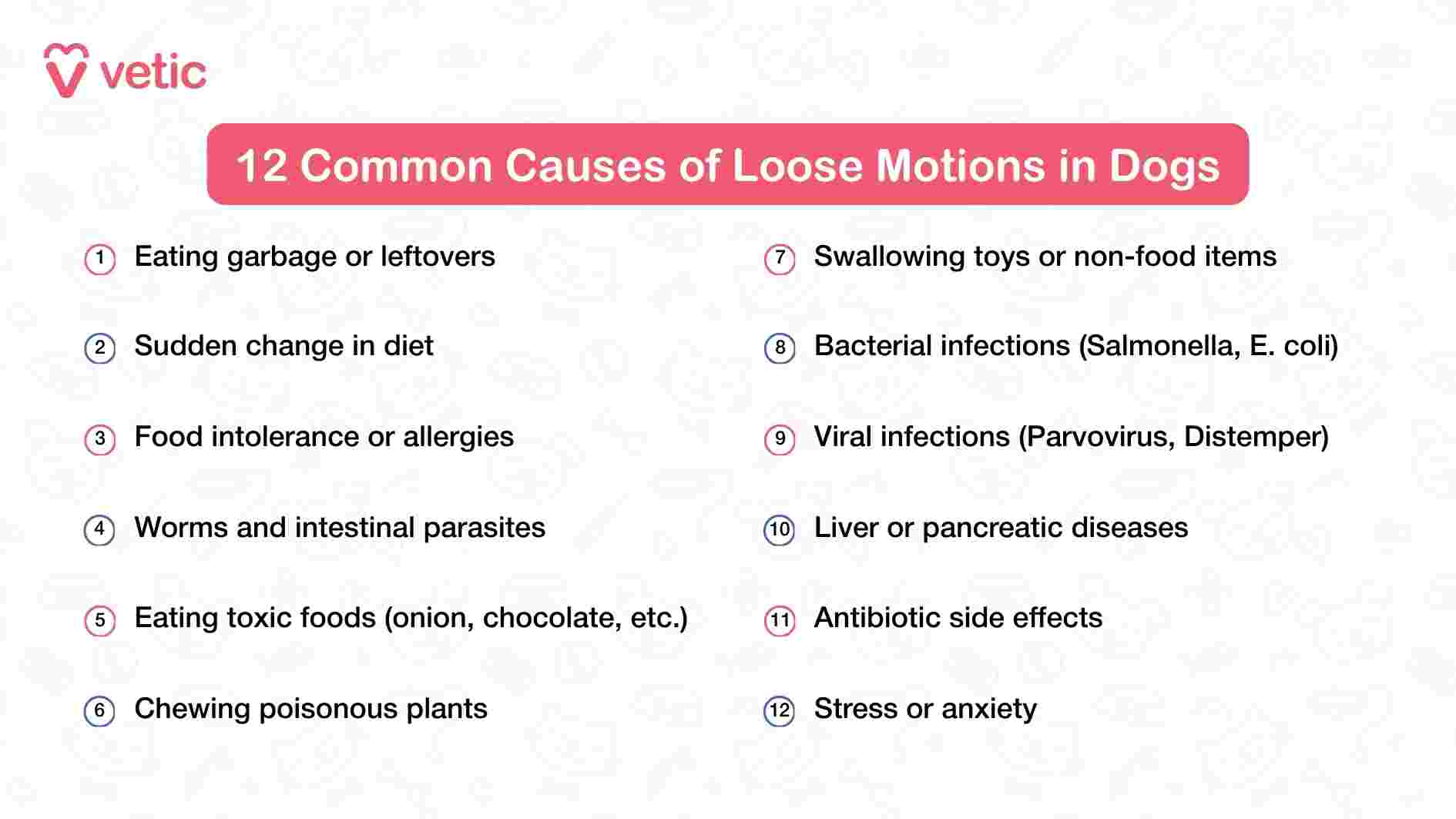
Loose motion in dogs can occur for many reasons, from a simple dietary mistake to a serious infection. The most common causes include:
- Sudden dietary change or food intolerance
- Parasite infestation (worms, giardia, coccidia)
- Eating spoiled food, garbage, or non-food items
- Bacterial or viral infections
- Stress and anxiety
- Chronic illnesses affecting the liver, pancreas or intestines
In most cases, mild diarrhoea lasts 24 to 48 hours. However, persistent or severe loose motion needs medical attention to rule out infections or underlying diseases. A simple blood test and stool test can tell if your dog has an infection, and if so, what type.
What Medicines Can You Give Your Dog for Loose Motions or Diarrhoea?
Before giving any medicine, always consult a veterinarian. Many dog loose motion medicines may sound familiar but differ vastly in dosage and safety compared to human medicines.
Your vet might recommend:
- Probiotics and prebiotics to restore gut balance.
- Anti-diarrhoeal suspensions designed for dogs.
- Oral rehydration salts to prevent dehydration.
- Antibiotics or anti-parasitic drugs, only if an infection or worms are confirmed.
Do not give human medications like antibiotics without veterinary supervision; incorrect dosing can cause serious harm.
Your Dog Has Loose Motions. What Can They Eat?
When your dog has diarrhoea, their intestines are irritated. Gentle, bland meals can help soothe their stomach while preventing further irritation.
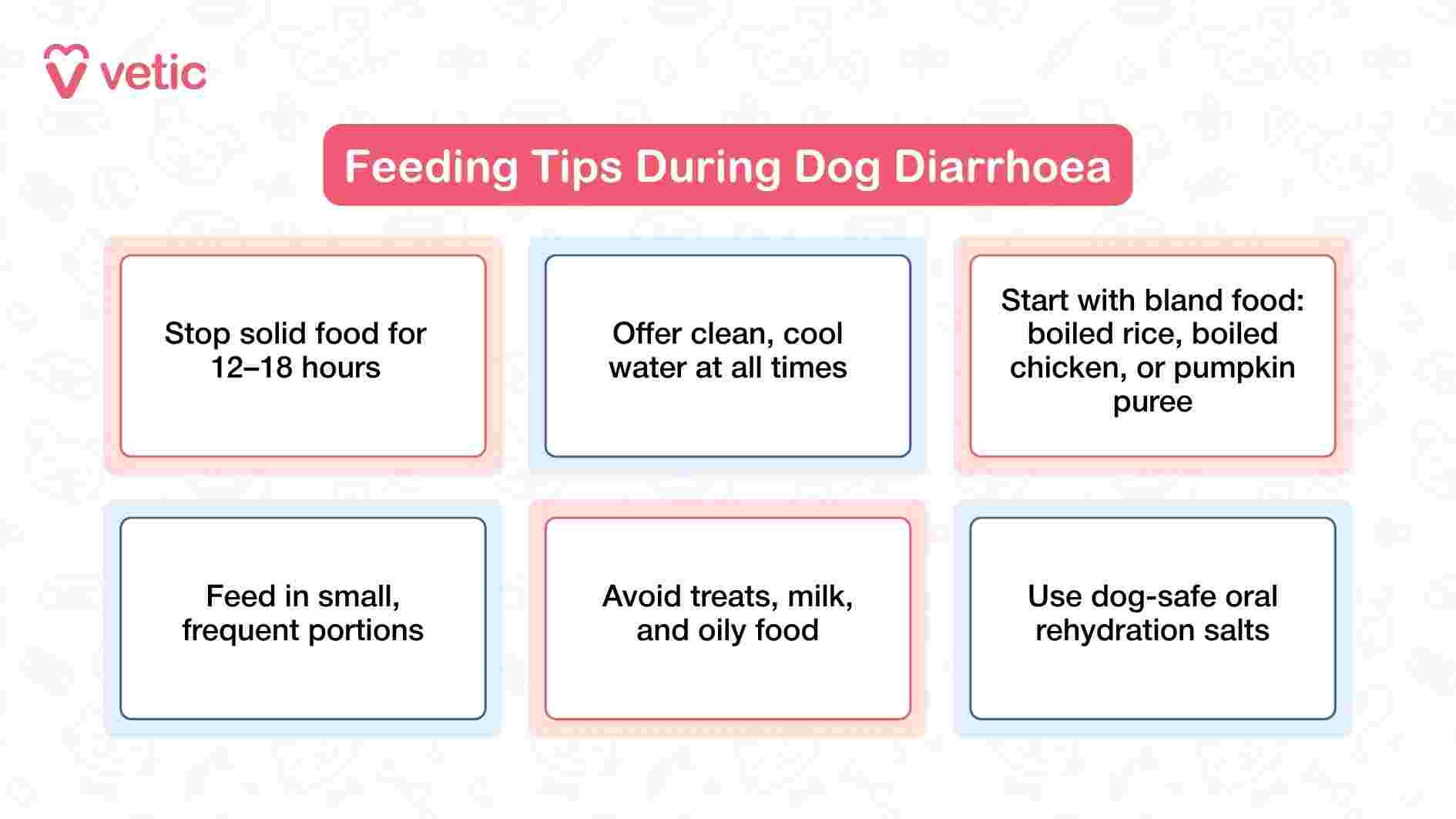
Start by withholding solid food for 12–18 hours (unless your vet advises otherwise). Then gradually reintroduce easy-to-digest foods such as:
- Plain boiled chicken (without skin or spices)
- White rice or boiled potatoes
- Pumpkin puree (rich in fibre, helps firm up stool)
- Plain unsweetened yoghurt (contains gut-friendly bacteria)
Offer small, frequent meals instead of one large portion. Ensure constant access to fresh water or veterinary oral rehydration solutions to prevent dehydration.
If your dog vomits after eating or continues to have watery stool, stop feeding and consult your vet immediately.
12 Possible Causes of Loose Motions in Dogs
1. Eating Garbage or Table Scraps
Dogs love exploring trash cans and leftovers. Eating spoiled food or waste often causes stomach upset and loose motion in dogs, commonly known as garbage toxicosis.
2. Sudden Dietary Changes
Switching dog food brands or transitioning pups from milk to solid food too quickly can trigger diarrhoea in dogs as their gut adjusts to new proteins.
3. Dietary Intolerance or Food Allergies
Some breeds struggle to digest lactose, gluten, or certain proteins, leading to stomach upset in pups and dogs. Always introduce new diets gradually under veterinary advice.
4. Parasites
Intestinal worms such as roundworms, hookworms, coccidia, or giardia are a leading cause of loose motion in dogs, especially unvaccinated or non-dewormed puppies.
5. Toxins and Poisons
Household foods like onion, garlic, chocolate, and raisins are toxic to dogs. Ingesting even small amounts can cause vomiting, diarrhoea, or life-threatening poisoning.
6. Poisonous Plants
Common indoor plants like aloe, dieffenbachia, arum lily, and oleander can irritate the gut, leading to severe loose motion in dogs. Keep them out of your pet’s reach.
7. Swallowing a Foreign Body
Dogs may swallow socks, toys, or bones, causing intestinal blockage and diarrhoea. Such cases need urgent veterinary attention and diagnostic imaging for safe removal.
8. Bacterial Infections
Consuming contaminated water or raw meat can expose dogs to Salmonella or E. coli, resulting in watery diarrhoea, vomiting, and abdominal pain requiring antibiotics.
9. Viral Infections
Unvaccinated puppies are prone to Parvovirus, Distemper, and Coronavirus, which cause bloody diarrhoea in dogs and need immediate hospitalization for IV fluids and treatment.
10. Chronic Illnesses
Long-term loose motion in dogs may indicate liver, kidney, or pancreatic disease, or Inflammatory Bowel Disease (IBD). Persistent diarrhoea always warrants veterinary testing.
11. Antibiotics
Even prescribed antibiotics can upset your dog’s gut flora, leading to temporary diarrhoea or soft stool. Probiotics often help restore healthy digestion after antibiotic use.
12. Stress and Anxiety
Stress-induced colitis is common during travel, loud noises, or major routine changes. Emotional stress can cause recurrent loose motion and stomach upset in dogs.
When Should You Contact Your Veterinarian?
It’s best to call your vet as soon as diarrhoea begins, especially in puppies or senior dogs. Some early signs may look mild but can progress rapidly.
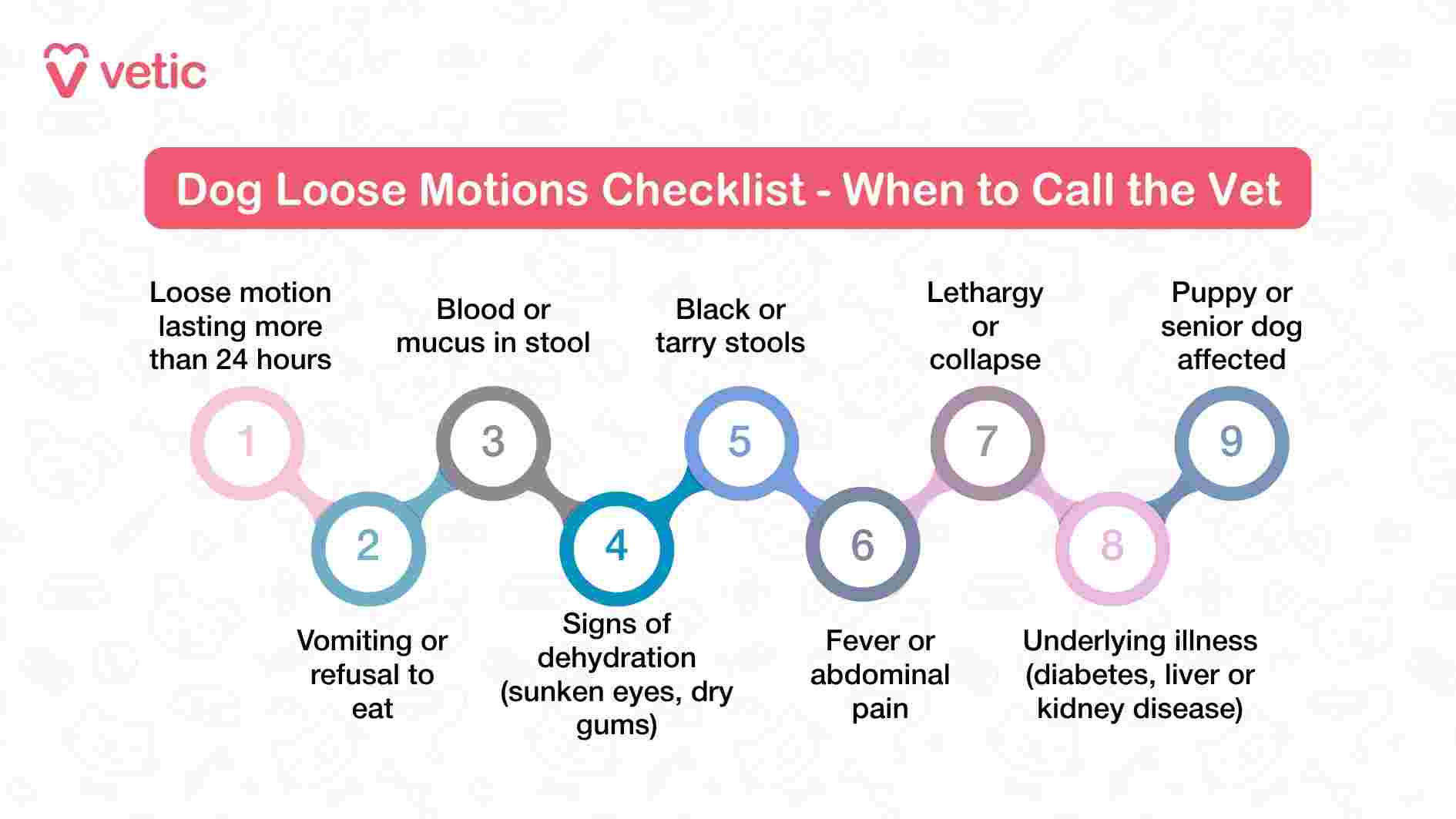
Contact your vet immediately if your dog shows any of these dog diarrhoea symptoms:
- Continuous vomiting or refusal to eat
- Lethargy, weakness, or collapse
- Blood or black streaks in stool
- High fever or abdominal pain
- Dehydration (sunken eyes, sticky gums, dry nose)
- Weight loss or bloating
Checklist for pet parents:
If diarrhoea lasts more than 24 hours, if your dog has underlying diseases (diabetes, kidney disease or liver issues), or if your pet is very young or old; check in with Vetic emergency.
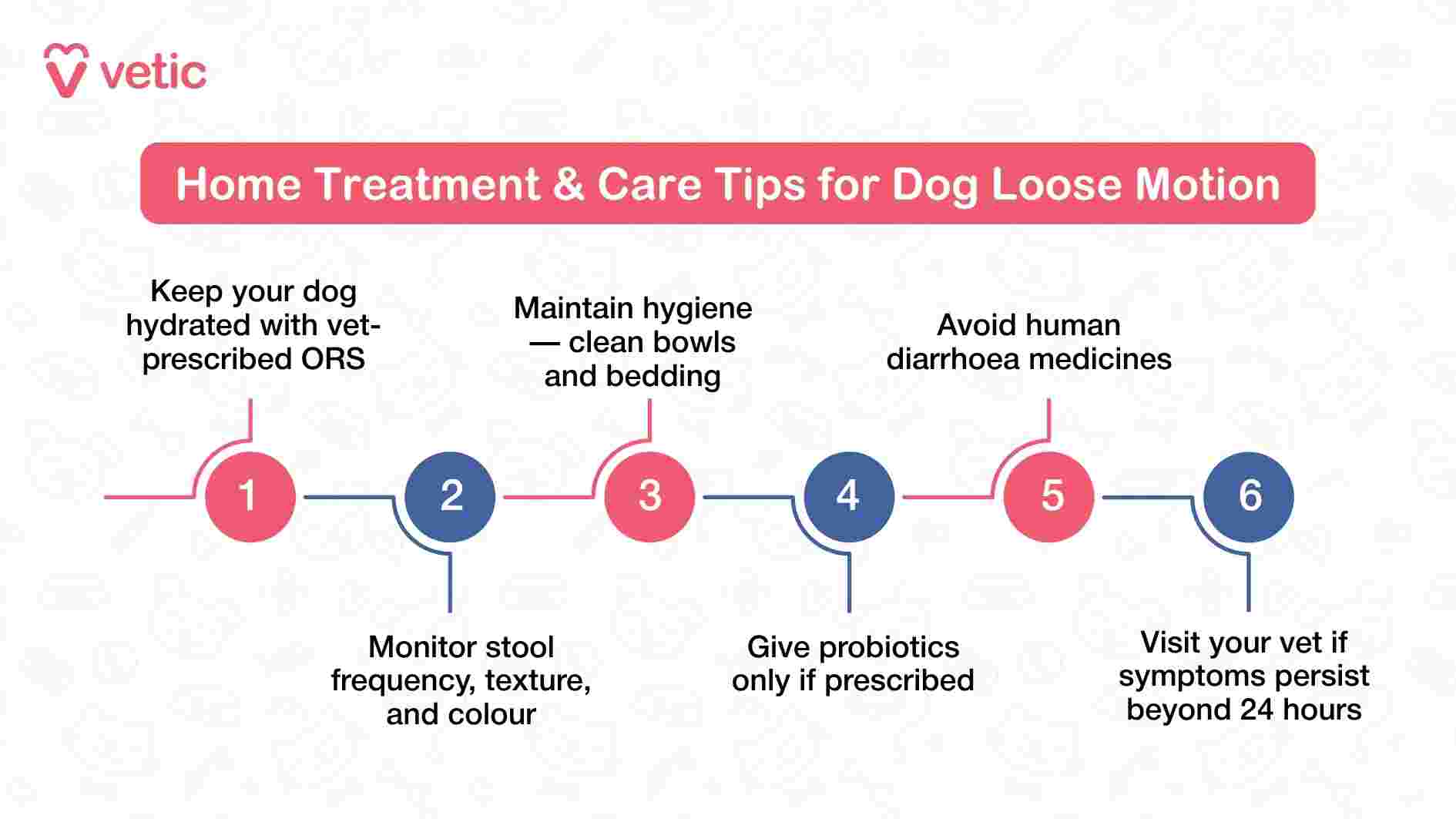
Delaying treatment can cause severe dehydration and electrolyte imbalance, which may require IV fluids and hospitalization.
What Does the Colour of Your Dog’s Loose Motion Tell You About His/Her Health?
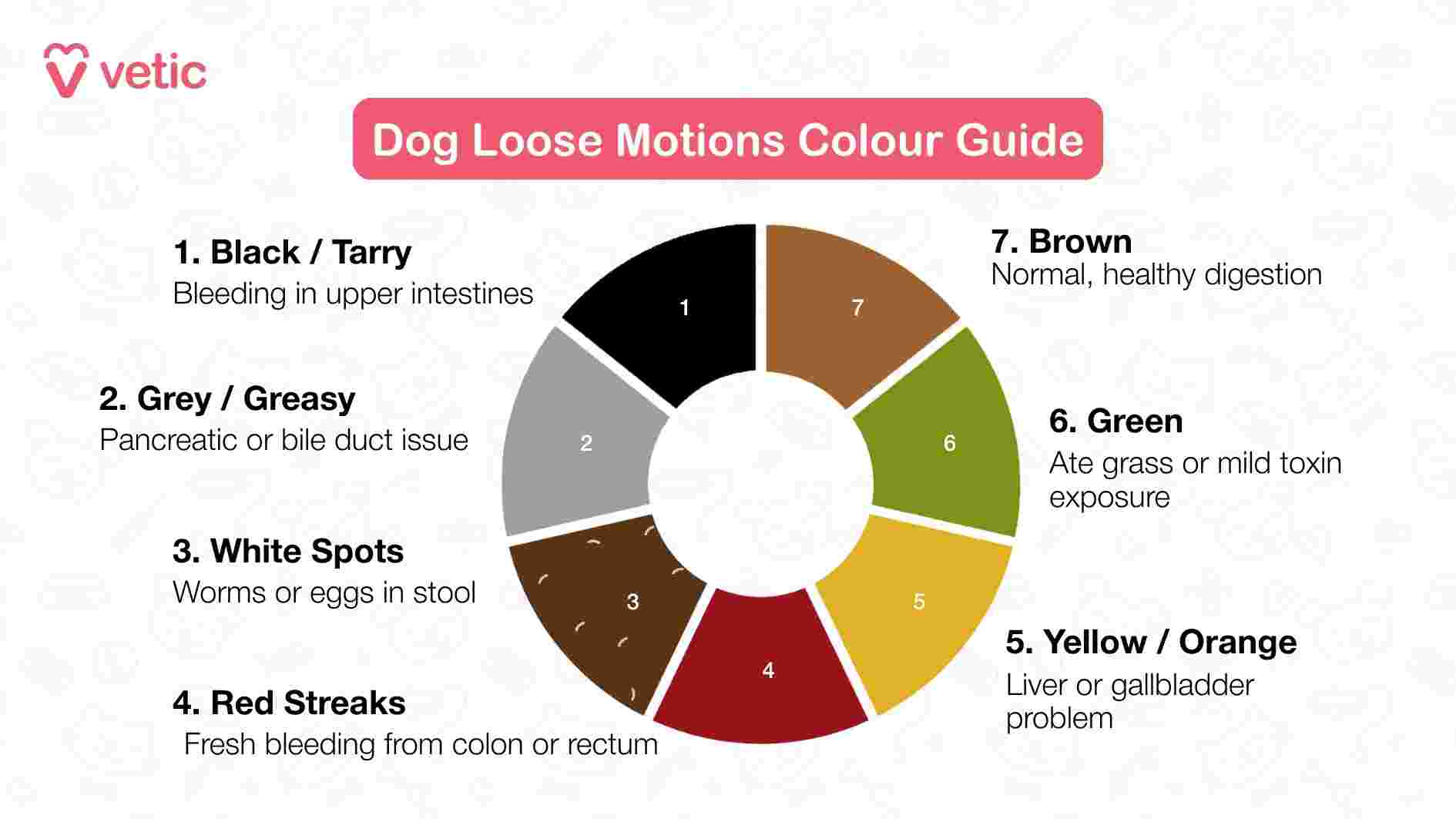
Dog poop colour can reveal what’s happening inside your pet’s digestive tract. Here’s what different shades could mean:
White Spots in the Poop
Indicates worms or eggs in the stool. Consult your vet for a deworming schedule.
Green Poop in Dogs
Could mean your dog ate grass or plants. If diarrhoea persists, it may be due to toxin ingestion or bile imbalance.
Yellow or Orange Poop in Dogs
Suggests liver issues or a bacterial infection. If stool is foul-smelling and slimy, visit your vet for tests.
Black and Tarry Dog Poop
A sign of bleeding in the upper GI tract — a medical emergency requiring immediate veterinary attention.
Brown Dog Poop with Red Streaks
Indicates fresh bleeding from the lower intestines or anus, often from repeated straining or inflammation.
Grey and Greasy Dog Poop
Often linked to pancreatic or biliary disease, where fat digestion is impaired.
If the stool colour remains abnormal for more than a day, take a stool sample to your vet for analysis.
What Should You Remember about Loose Motion in Dogs
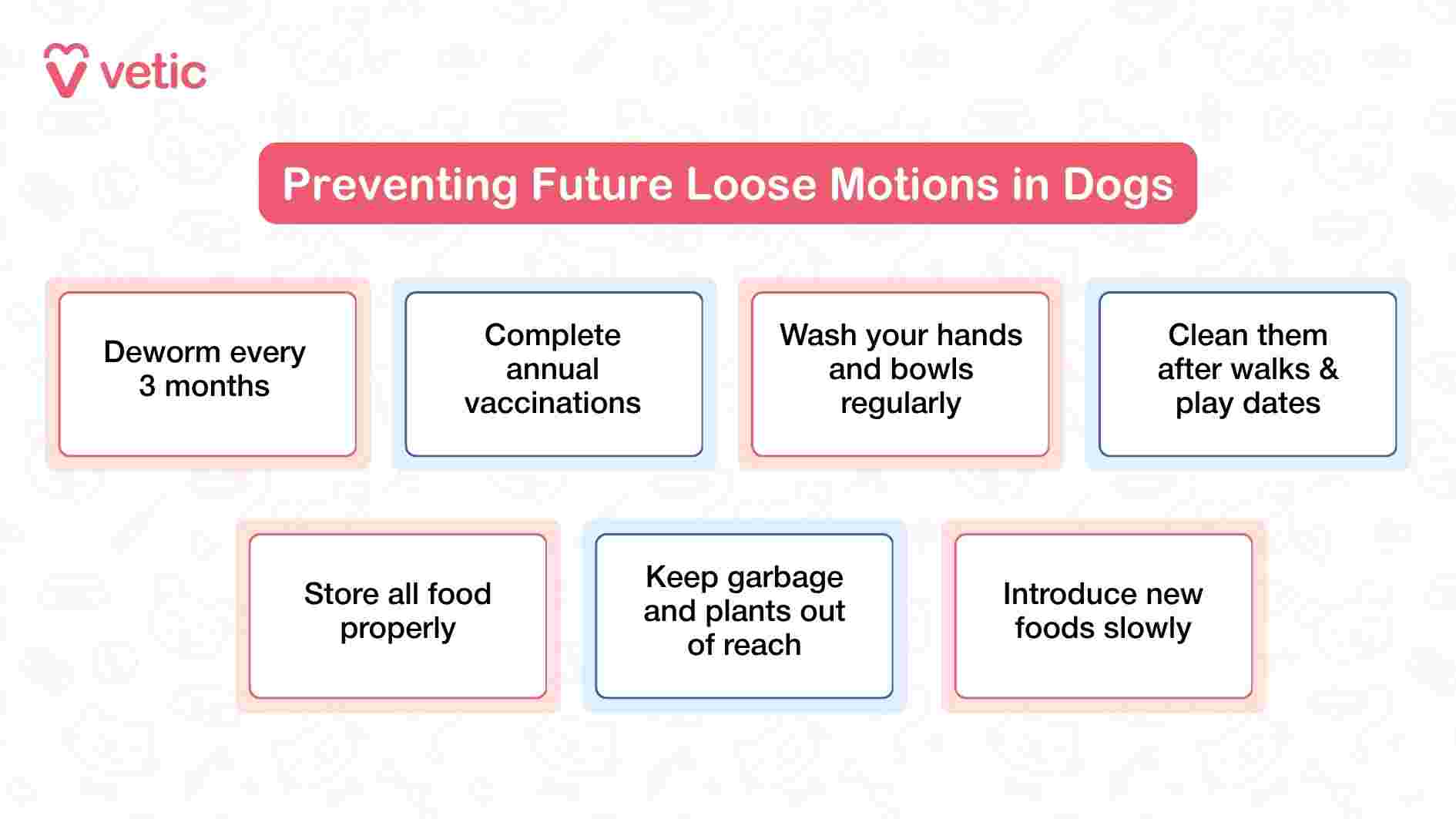
Dog loose motion can range from a minor tummy upset to a sign of serious disease. Always observe stool colour, texture, and frequency, and never self-medicate without veterinary advice.
A quick response, plenty of fluids, a light diet, and timely medical care can help your furry friend bounce back to health faster.
FAQs About Loose Motions in Dogs
What can cause loose motions in dogs suddenly?
Sudden loose motion is often due to eating spoiled food, trash, toxicity or a change in diet. Parasites and infections are also common causes.
How long does dog diarrhoea last?
Mild diarrhoea usually improves within 24 to 48 hours. Persistent or bloody stool needs immediate veterinary care.
Can I give human medicine for treating my dog’s loose motion?
No. Human medicines are unsafe and may worsen the condition. Always use vet-prescribed dog loose motion medicine.
What home remedies help with loose motions in dogs?
Plain rice, boiled chicken, pumpkin puree, and yoghurt can help soothe the gut, but consult your vet first. If your dog has persistent diarrhoea, contact your vet instead of relying on home remedies.
Can stress cause loose motion in dogs?
Yes. Dogs often experience diarrhoea during travel, fireworks, or major environmental changes due to stress-induced colitis.
When should I worry about dog diarrhoea?
If it’s accompanied by vomiting, blood, dehydration, or lasts over a day, it’s time to call your vet.
How do I prevent loose motion in my dog?
Keep vaccinations and deworming up to date, avoid raw or spoiled food, and table scraps, and introduce new diets gradually.
What is the best dog loose motion medicine?
The best medicine depends on the cause — it can be a combination of probiotics, anti-parasitics, or antibiotics. Some may require fluid therapy for rehydration. Always let your vet decide.

